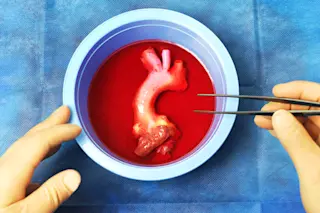The picture is of an aortic valve freshly dissected from a donated human heart, sitting on the aseptic processing field at the CryoLife tissue lab outside Atlanta. It is currently in a solution of tissue culture media to ensure the cells remain viable, and will undergo decontamination processes and cryopreservation at liquid nitrogen temperatures before storing. The valve regulates the flow of freshly oxygenated blood from the heart's left ventricle in to the aorta, the largest artery in the human body. Heart defects present at birth, infections, and age-related problems can all impair heart valve function, necessitating replacement surgery. CryoLife began storing frozen human valves for surgeons in 1984; previously, replacement valves often came from pigs. Nathaniel Perkel/CryoLife, Inc.
Your (Cryogenically) Cold Heart
Discover how aortic valve dissection plays a crucial role in heart valve replacement surgery and valve preservation techniques.
More on Discover
Stay Curious
SubscribeTo The Magazine
Save up to 40% off the cover price when you subscribe to Discover magazine.
Subscribe













